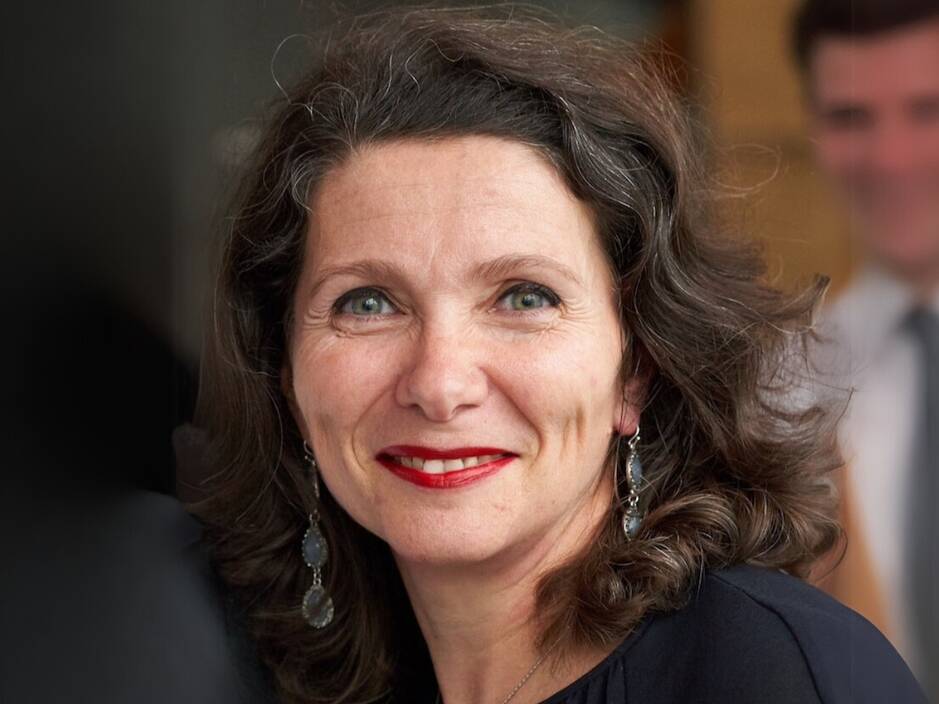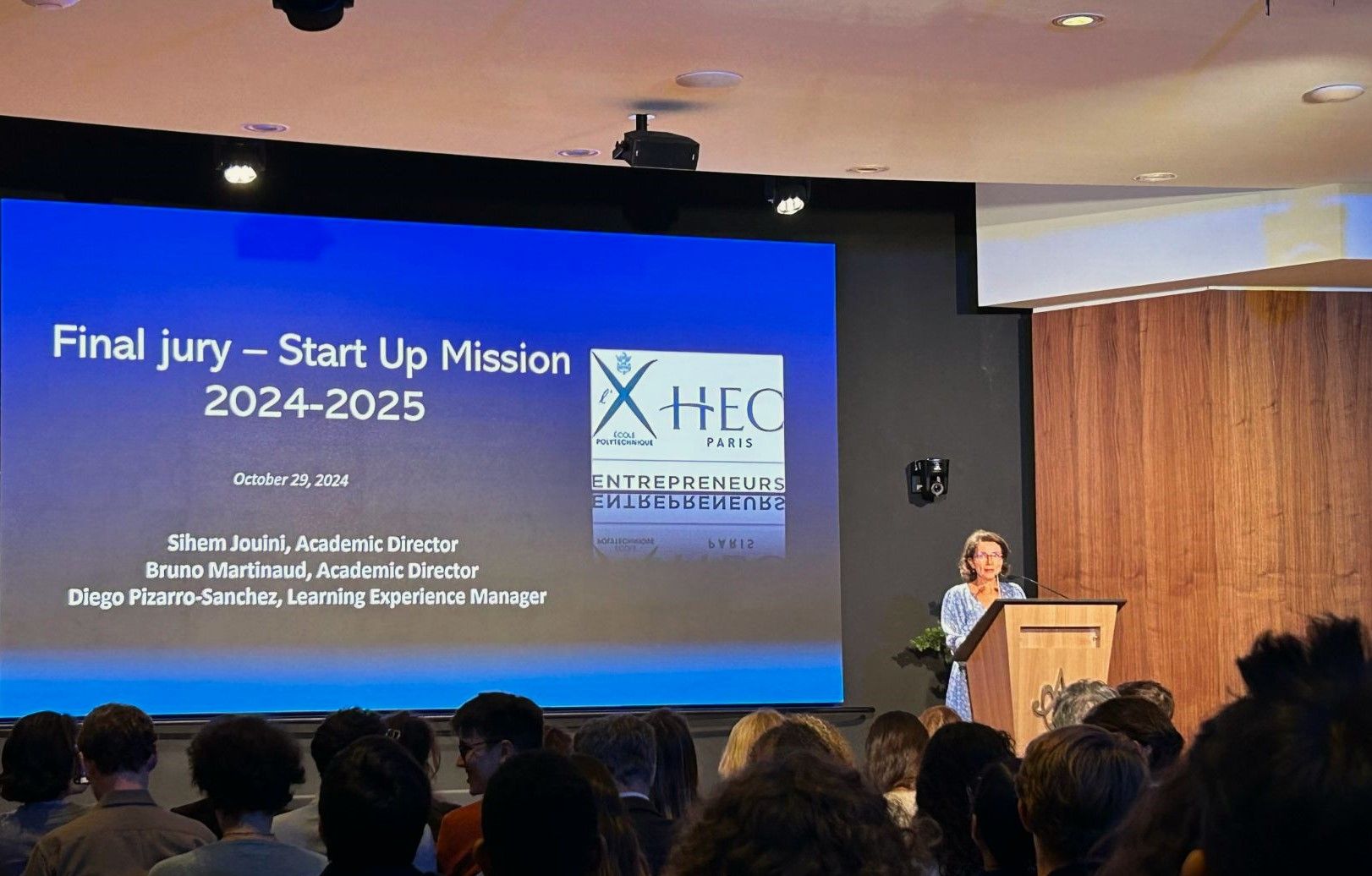Experiential Learning in MSc X-HEC Entrepreneurs
The experiential learning behind the MSc X-HEC EntrepreneursDid you know that the MSc X-HEC Entrepreneurs, in collaboration with École Polytechnique, is the oldest of our entrepreneurship programs? It has been the inspiration behind many successful entrepreneurs and companies, such as Ankorstore, Doctolib and the French unicorn Front. To understand its success, we interviewed Sihem Ben-Mahmoud Jouini, Associate Professor at HEC Paris and Academic Director of the program, to discuss the program’s approach to entrepreneurship and the importance of experiential learning.

Professor Sihem Jouini, can you tell us more about your background?
Professor Sihem Jouini: Sure. I'm actually an engineer by training, with a Ph.D. in innovation management and strategy. My journey as a Professor and Researcher started with new product development and project management for innovative projects, and over time, I became progressively interested in the exploration and the generation of the ideas that are developed by the projects, and how we can ensure that the innovations developed create value that can be captured. This interest led me, for example, to study design as an approach and a capacity to innovate and to publish research articles and a book on this subject.
How did you come to be involved with the X-HEC Entrepreneurs program?
Professor Sihem Jouini: I joined the Master as the Academic Director in 2021, but the program has a very long history that goes beyond myself. It's a 46-year-old program. The current program is the result of a merger 7 years ago between two established entrepreneurship programs: one from HEC Paris with over 40 years of history, and a more recent program from École Polytechnique led by Bruno Martinaud. X-HEC Entrepreneurs combines business acumen with technological expertise as a result.
To answer your question more precisely, I joined the Master's because of its ‘Learning By Doing’ approach, which by the way was pretty uncommon 46 years ago. I value this approach in my teaching as well as in my research which is focused on action research. The MS has a strong orientation towards action in a collective setting. We encourage our students to explore problems people face, ensuring that the solutions they develop would address crucial issues. Then, we encourage them to articulate hypotheses about needs, markets, technologies… as well as to test these assumptions through prototyping and experimentation. I joined the Master as well because it mixes different students’ profiles, especially STEM, law, art, political sciences and business and I value this diversity.
Another reason for my decision to join this Master is that I am also the academic director of the Innovation & Entrepreneurship specialization of the Executive MBA which gives me the opportunity to connect several audiences from HEC interested in entrepreneurship.
What is your role as the Academic Director of the MSc X-HEC Entrepreneurs?
Professor Sihem Jouini: My role is multifaceted!. I'm involved in selecting the cohort to ensure diversity and homogeneity, in designing the curriculum and the content by curating the subjects and the way they are delivered (professors, guests, workshops, seminars, etc.), and in overseeing students’ master thesis, because we deliver a master diploma as much as we develop entrepreneurs. I work with the administrative team that manages the program day to day, and I manage the partnership with Ecole Polytechnique represented by the co-director of the MS there Bruno Martinaud. I also represent the program in the broader entrepreneurial ecosystem. It's challenging to maintain our high standards at the scale of 120 students per cohort and to make our students flourish in the entrepreneurial landscape.

What sets the X-HEC Entrepreneurs program apart from other entrepreneurship programs?
Professor Sihem Jouini: Our strong commitment to pure experiential learning and peer learning is definitely our main differentiator. That’s what truly distinguishes us. In our program, professors do not give a lecture and students apply concepts to case studies afterward.... Instead, we put our students in real situations of uncertainty, where they don't have all the information, and need to learn and acquire knowledge in order to make decisions. We believe that to truly learn about entrepreneurship and innovation, they need to experience this firsthand.
Can you give us some examples of how this experiential learning approach works in practice?
Professor Sihem Jouini:
Of course. We design situations (seminars, projects, workshops, etc) to expose our students to various aspects of entrepreneurial uncertainty and we support them with methodology and knowledge to make them decipher this uncertainty. We organize ENTR’AIDE, an outdoor challenge that makes students navigate unfamiliar terrain, move forward together and stay united despite the difficulties encountered. Another highlight is the restructuring mission: with the support of experts and tutors, they work on real companies about to go bankrupt and present their suggestions to real judges in commercial courts. I think as well about the Sales Seminar, which is quite an experience. During 5 days, students learn how to sell in the shop, how to manage a sales force, how to convince a customer, etc. We also organize a Leadership Seminar in the Ecole Navale, the military school of the Navy.
This is not exhaustive…the list is long. It is very challenging for the team in charge to organize all this considering the size of the cohort, but it's also incredibly rewarding to see how our students benefit from it. It is a very dense program and that’s why we need smart and committed students, able to keep up.

The program seems to have strong connections to the entrepreneurial ecosystem. Can you tell us more about that?
Professor Sihem Jouini: Yes, that's another key aspect of our program. It is highly connected with HEC Paris and Ecole Polytechnique alumni communities, and the entrepreneurial ecosystem in France and beyond. The Master Alumni group (les pineurs) is a very strong community that plays a critical role in the pedagogy. We rely on it. Indeed, is a peer to peer learning, alumni act as mentors and tutors to accompany the students in the development of their ventures and of themselves as entrepreneurs. They provide projects the students develop per team in potential startups during the first 8 weeks of the year. They act as jury members in the closure event of the year, i.e. the Demoday
It is important as well for our students to be projected and exposed to many different networks and landscapes. This way, they can build a startup in France or Singapore,, raise funds in Silicon Valley, go to Y Combinator, etc. We actually have several connections with Silicon Valley: we are proud to have alumni who have launched successful ventures there, including the unicorn Front. We also organize learning expeditions into major entrepreneurial hubs. These connections provide our students with real-world examples of entrepreneurial successes and opportunities.
As a recap, what are the strengths of the X-HEC Entrepreneur Master?
It’s a unique combination of 5 pillars:
- A project-based pedagogy and mentorship. The students work on real projects per team following a challenging pace. They learn how to find under time pressure the required information and acquire knowledge through their actions in a trial/error approach. They do that in different configurations and are tutored by mentors, who give our students the methodology and support on top of the courses.
- A complete life cycle venture. We go through all the phases of the lifecycle of a company, which involves the market exploration and launch as well as addressing the crises, through restructuring. Working with entrepreneurs in difficulty is definitely a very specific aspect of the program. 10% of our students choose to take over a company.
- A personal entrepreneurial journey. We help them discover which type of entrepreneur they would like to become. Actually, the program is decomposed in four explicit phases: Learn, Test, Fasten and Become. We support our students in becoming entrepreneurs. Some will realize they don’t want to launch a venture but want to take over an existing business, or develop intrapreneurship in an existing company or act in an NGO or go for politics, etc. In the Test phase, they can work on their own projects in various programs like the HEC Paris Startup Launchpad, the Imagine Institute in Paris, the University of California, Berkeley in the USA or at the Singapore Management University (SMU), where they get the best support to find out who they want to become.
- A strong alumni network, of more than 80,000 people, and a wide ecosystem, always happy to help. Alumni are generally eager to give back by dedicating time and effort to the students.
- A diverse cohort leading to diverse ventures, the cohort is composed of 1/3 business students coming from HEC Paris, 1/3 of STEMS students such as engineers from École Polytechnique and other schools and 1/3 of students in art, design, law, political sciences… This diversity ensures that the students will find co-founders within the cohort. It leads as well to a diversity of the ventures developed from Deeptech to Techsupported or Shallow tech.

About X-HEC Entrepreneurs
The Master X-HEC Entrepreneurs program immerses students in real-world entrepreneurship, teaching valuable skills through hands-on entrepreneurial missions within a vibrant ecosystem. This experience shapes their entrepreneurial mindset before they embark on their own projects.
About HEC Paris Innovation & Entrepreneurship Institute
The institute supports entrepreneurs from all walks of life. Through our Incubation & Acceleration, Deeptech, and Social Entrepreneurship centers, we assist students with innovative ideas, budding startups, rapidly scaling SMEs, transforming large enterprises, and social or environmental entrepreneurs to grow efficiently and with impact. Here, the entire entrepreneurial ecosystem of HEC Paris comes together to help you Make it Happen, Make it Big.